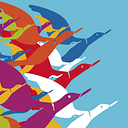Five Ways to Build Social Sustainability Wherever You Are
By Alyson Ewald, Red Earth Farms, Missouri, U.S.
Starting in October, students from all over the world will gather online to explore the Social Dimension of sustainable design. For two months we’ll explore concepts that can bring greater trust, connection, and resilience to all kinds of groups. Without these attributes, many groups are unable to reach their world-changing potential. Don’t let it happen to you!
Here are five crucial practices learned in ecovillage “laboratories” that are being applied in organisations, universities, town halls, families, and wherever people gather.
1. Listen for common ground. With social media’s focus on self expression, many people are losing the ancient art of listening. But no matter what kind of venture you’re launching, it’s best to start by listening closely to the needs and values that your group members have in common.
In our homeschool co-op this year, an organiser invited several new teachers and arranged their classes into a packed schedule: woodworking, Spanish, film, music, etc. But parents and students objected that the “basics” were being lost, the days were too long, and some kids were left out. The organiser hadn’t listened to the needs of parents and kids. Finally she heard us, and together we re-organised the schedule. Save yourself the pain and listen carefully from the start!
2. Cultivate curiosity. At your next meeting, try asking yourself, “What’s important to the other person? What motivates them? What are they needing at this moment?” Through practices like nonviolent communication, we can cultivate a healthy sense of curiosity about the needs of others, express our feelings clearly, and get feedback about our impact. Holding other people’s needs as dearly as our own is much easier when we’re curious about others and respect our differences.
3. Share leadership. Consensus isn’t just for ecovillages any more.Business and organisations are waking up to the power of sharing leadership. Through methods like sociocracy and holacracy, more and more business leaders are discovering that cooperative governance is not just an idealistic pipe dream. Instead it creates more job satisfaction, sparks creativity, and often leads to a better product or service.
4. Learn from conflict. Restorative community engagement with conflict has shown us that when we get enough support, we can find ways to move toward conflict safely and learn what it can teach us. Conflict gives us specific information about how our current social systems cause pain. This can yield transformative results that help us shape more just, peaceful communities. The Restorative Circle process developed in Brazil has been adopted by communities, towns, schools, prisons, and even justice departments around the world.
5. Get support. There was a time several years ago when three of the six families in our rural eco-farming community announced they were leaving. For me, as a founder, it was a time of despair. Only my strong connections with friends and neighbors — through women’s circle, co-counseling, song circle, potlucks, and my work as a teacher and facilitator — kept me hopeful and active.
Beyond our own personal support networks, there are active global webs to support those embarking on cooperative ventures. Community directories and bookstores by FIC and the knowledge base of the Global Ecovillage Network are two of them. The Ecovillage Design Education courses and the e-learning Gaia Education Design for Sustainability course (GEDS) provide transformative learning journeys.
Whatever kind of network nourishes you, keep it healthy, so it’s there when you need it. And if you would like to learn more about how to build these five skills and more, please join the Social Dimension of the GEDS course with us. I look forward to meeting you.
Gaia Education is a leading-edge provider of sustainability education that promotes thriving communities within planetary boundaries.
Want to know what you can do? The Social Design dimension of the course starts on 23rd October 2017 and there are still places left, so sign up now!
